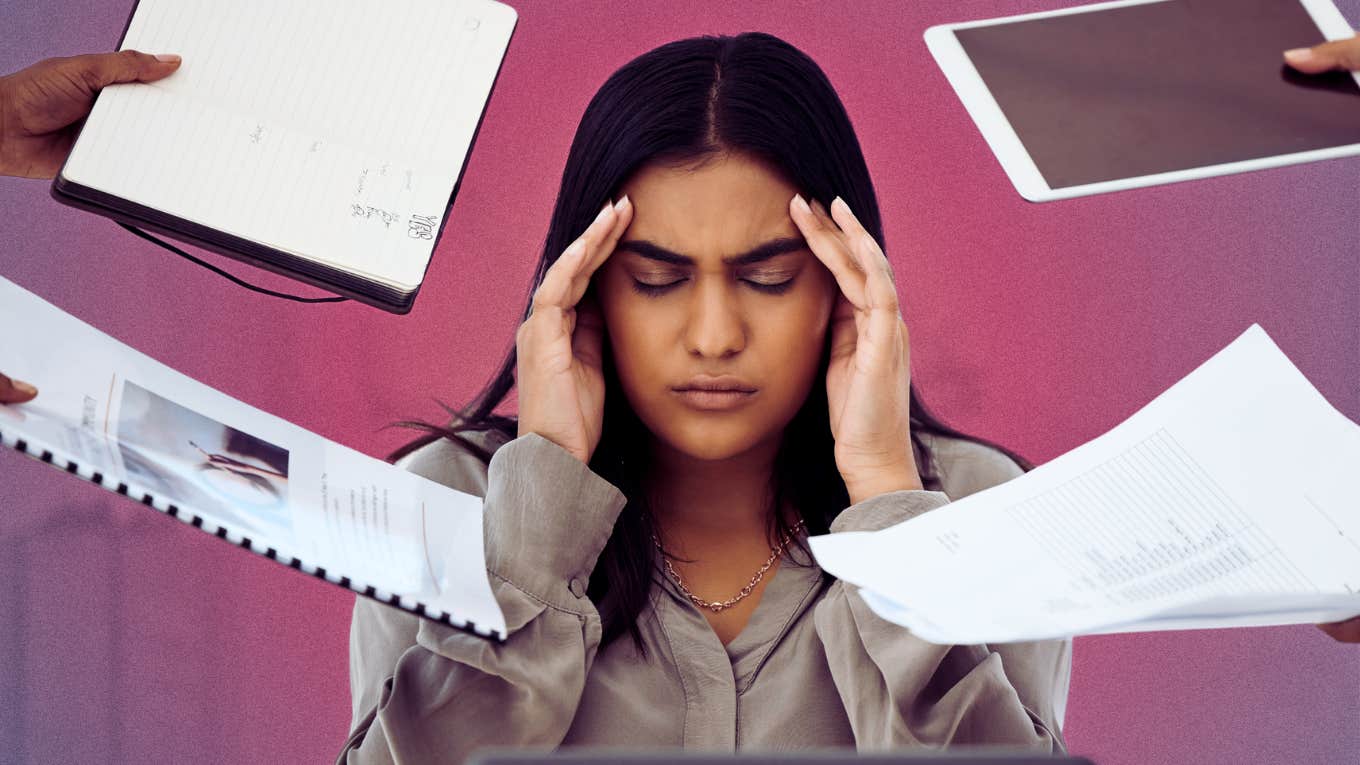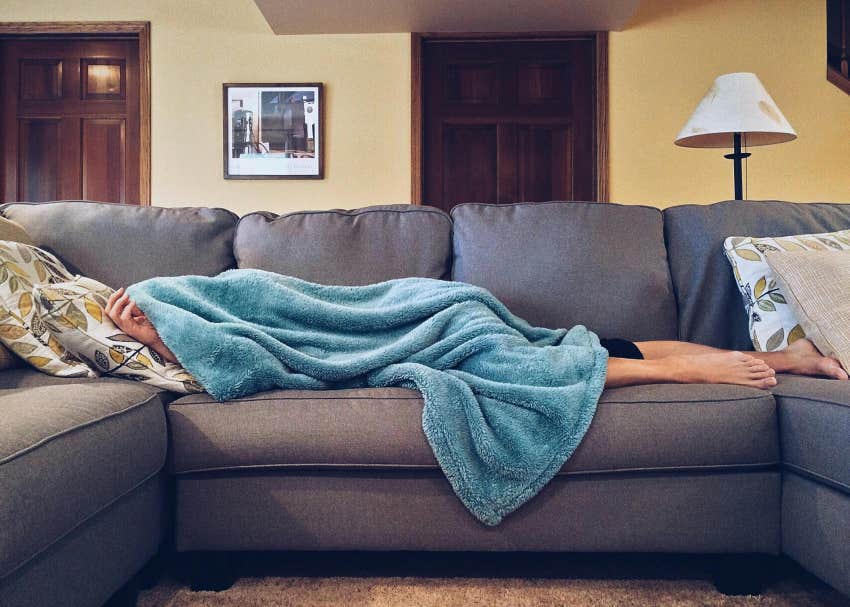12 Critical Steps To Help You Recover From Extreme Burnout
You've been doing too much too quickly.
 Peopleimages.com | Canva
Peopleimages.com | Canva Are you currently experiencing extreme burnout? Have you been searching terms like “adrenal fatigue,” “how to rest,” and “extreme tiredness?" Whether you’re experiencing burnout from a place of workaholism-induced fatigue, situational depression, or a chronic (i.e., multi-year) lack of rest, there are things you can do to recover from your burnout faster than you thought possible. For the first three years of starting up my business, I barely took a day off. And I mean barely. Even saying barely feels generous. My best guess is that within my first three years of writing online, I may have had a total of ten days where I did zero work.
Over the following two weeks, I subjected myself to a battery of tests from doctors, naturopaths, and other healers, and nothing showed up. My blood work was pristine. I didn’t have mono. I wasn’t depressed. I was just... exhausted. The best advice that I got from my doctor was to take some time off for a while. While rest is a sound solution for most ailments, I knew that I wanted to do more to be proactive in my recovery. Through my rounds of experimentation, I tried supplements, lifestyle changes, and a bunch of fringe hippy stuff. Throughout it all, I noticed what moved the needle for me and what didn’t.
Without further ado, here are the 12 highest-leverage things that I did to recover from my bout of extreme burnout. I saw two naturopaths and one doctor who told me that it would likely take me anywhere from 6-12 months to fully recover from my state of fatigue. By adhering to the following protocol, I noticed a significant uptick in my energy levels within 2-3 weeks and felt almost 100 percent in under two months.
Here are 12 critical steps to help you recover from extreme burnout:
1. Decide to make your health your number one priority
Illnesses are what happens to our bodies when we’ve been ignoring their messages for too long. When you reach a point of extreme burnout, you’re there because you’ve been overriding your body’s message to slow down and rest for too long. It seems no other way than to stop you dead in your tracks and make you listen.
You must make the conscious decision that you are going to listen to your body and make your health your number one priority from now on. Not just until you feel a bit better so that you can get back to your "normal" life, but literally from now on. This is a wake-up call. It’s time for you to create some fundamental shifts in your life that will see you honoring your health more daily. No more taking your health for granted, it’s time for a real change.
2. Take an actual break to reset your nervous system
There are likely a handful of things in your life that you’ve been engaging in that have been draining your metaphorical batteries for a while now. To earn your way back to a clean bill of health, you must begin by taking a proper break from the things that have been exhausting you. Take a two-week break from work. Start saying no to social events that drain you. Pass off your least favorite responsibilities to someone else for a while. Yes, people will be disappointed with you. But your health comes first.
 Pexels / Pixabay
Pexels / Pixabay
3. Reach out for help
If you’ve reached a place of full-on burnout, you’ve likely been shouldering too much for a long time. Do you find it difficult to ask for help? Do you feel like no one has your back? Do you live by the moniker, "If you want something done right, do it yourself?" Stop trying to do life on your own. Ask your friends for support. Tell your family members or close confidants that you’re struggling. Let people in. There is probably a flood of people who would want to help you with your situation if they only knew how much you needed their help. We are a social species. We need each other to thrive. You are no exception. Reach out to a handful of people and ask for their help. Start now.
4. Build a team of healers to help you on your journey
It took more than one factor to get you to this place of burnout, and it’s likely going to take more than one form of treatment to help you get better. On my journey, I visited a medical doctor, two naturopaths, a registered massage therapist, an acupuncturist, an energy healer, and a therapist. I made healing my full-time job, and I knew that having a dedicated team of healers around me would expedite my process.
While I’m not guaranteeing you’ll need more than a simple visit to your doctor to get the clarity that you’re looking for, it never hurts to get multiple opinions and tests done, just to rule out various health factors. Healing your physical body from extreme burnout is a war of attrition, not a war of annihilation. Put in another way, lots of little things are going to add up to helping you to heal, more likely than it is that you’ll find one magic bullet to heal you right away (as nice as that would be). So enlist help. Yes, friends and family, but also enlist the aid of people who help others heal professionally.
5. Regularly engage in slow, gentle forms of exercise
The health benefits of exercise are innumerable, but when you’re in a phase of extreme burnout it can be challenging to get out of bed, let alone get yourself to the gym to have a personal trainer kick your butt around the room for a full hour. When it comes to getting your blood flowing during your burnout recovery, ease is the name of the game.
Engage in exercise for short periods, without pushing yourself too hard. Go for slow walks away from traffic noise. Stretch for a few minutes on the ground in your living room. Go for a walk in the forest with a friend. Practice yoga from home. Dance around your home to a song that you like. If you find yourself even more tired the day after your workout, you may have been pushing a bit too hard. Whatever form of exercise you engage in, make sure you aren’t overly exerting yourself.
 Pexel / Li Sun
Pexel / Li Sun
6. Make room for play and laughter in your life
Laughter is like an instant vacation. If you’re chronically waking up and barely able to function, life can seem pretty unmanageable and certainly not very funny. But it’s important to do whatever you can to prioritize laughter and play in your life. Watch stand-up comedy (live or online). Invite your most hilarious friends over for breakfast. Go see professional improvisational comics do their thing. Whatever it is that tends to tickle your funny bone, put it on your calendar and make it happen.
7. Question and re-prioritize your values
Whatever millions of little decisions led you to your particular form of burnout, the root cause of your having gotten there is most likely, at least in part, screwy values. As an example, if you value financial gain over your health, sooner or later it’s going to bite you. Take a moment to sit with the question: “What have I been valuing that has led me to this place of extreme burnout?”
8. Eat small meals frequently to avoid sugar spikes
During your burnout recovery, you want to ensure that you’re being as gentle with your blood sugar levels as possible. The worst thing you could do is consume two or three massive, overly processed meals per day. The best thing you can do is eat four to six small, nutrient-dense meals per day.
9. Eat five certain foods more often
On top of a generally healthy, nutrient-dense palate of foods, throughout my research, I found a handful of foods that contributed to burnout recovery the best:
- Pasture-raised egg yolks
- Organic, grass-fed bone broth
- Avocado/organic avocado oil
- Organic pumpkin seeds
- Flax seeds/flax seed oil
Buy organic whenever possible (for the above five foods, and what you eat, in general).
10. Avoid processed sugar, caffeine, and any other stimulants or drugs
Again, in line with taking it easy on your blood sugar levels, you want to ensure that you’re avoiding all refined sugar, caffeine, and any other stimulants or drugs. No alcohol, smoking, or junk food. This might sound challenging to you, but it’s necessary. In terms of your burnout recovery, there’s more flexibility with sugar than there is with drugs, alcohol, and caffeine, but truly do your best to avoid all of the above, especially during the first 2-4 weeks of your recovery. If you find yourself having a craving for junk food, just drink a liter of lemon water, eat some coconut oil and/or cashew butter, and take a nap. Believe me, your body will be much happier with you.
11. Add supplements
The first thing that I started doing was when I felt my burnout/adrenal fatigue/exhaustion creep up on me as I started researching all of the supplements that I could start downing daily to recover more efficiently. While I don’t believe in any magic bullet or overnight quick fixes, I do believe in pumping my body full of vital nutrients that aid in speedy recovery. Through my research, these things ended up being the most significant for me. I took most, if not all, of them daily for the first 4-6 weeks of recovery.
- Ashwaghanda
- Holy basil tincture
- Magnesium bisglycinate (450-600 mg per day)
- Licorice root extract
- Liposomal glutathione
- Zinc
- Liposomal vitamin C
- B vitamin complex
- Flax seed oil
- Omega 3 + DHA
- Caffeine-free electrolyte tablets
- A high-quality, organic green powder
12. Regularly do nothing
As much as I benefitted from getting massages, getting blood work done with my doctor, and turning into a human pin cushion at my acupuncturist's office, there were many days when the best thing that I could do for myself was to stay home and do nothing. For the type-A overachievers out there, doing "nothing" might seem like too nebulous of a concept. So, here are some options as to what doing nothing could look like.
- Sit in front of the ocean/a large body of water and just look at it.
- Lie on your back on the ground and just breathe.
- Take a nap whenever you feel called to nap.
- Take a long, luxurious Epsom salt bath.
- Go to bed early, and stay asleep for as long as you’re able to.
Remember, any kind of extreme burnout phase is meant to be a wake-up call. If you’re feeling this tired, then what is it in your life that needs to change? For me, it meant less screen time, only putting out articles that I deeply believed in, and spending more time investing in my rest and self-care. For you, it could be something completely different. Get in the habit of regularly checking in with your body and asking it what it needs from you. Your body is wise. It has a lot more answers for you than you might think.
Jordan Gray is a five-time Amazon best-selling author, public speaker, and relationship coach with more than a decade of practice. His work has been featured in The New York Times, BBC, Forbes, The Huffington Post, Women's Health, and The Good Men Project, among countless others.

